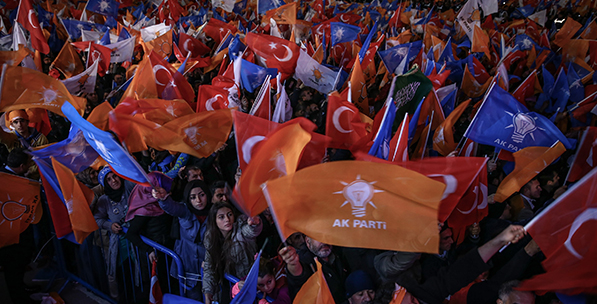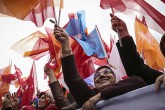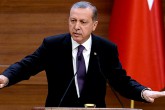The Nov. 1 parliamentary elections are successfully complete with a nearly 90 percent voter turnout. As a result of the elections, the Justice and Development Party (AK Party), Republican People’s Party (CHP), Nationalist Movement Party (MHP) and the Peoples’ Democratic Party (HDP) all succeeded in entering Parliament and the chamber will represent 97.5 percent of the electorate.
The Nov. 1 elections occurred in an atmosphere of great political tension. The AK Party completing the election by itself and receiving a much higher percentage of the vote than expected – nearly one of every two votes – brought respite in the truest sense to the political environment.
The various actors on the political stage have begun to speak of the need for normalization, the need for the decrease of political polarization and reconciliation since the night of Nov. 1. The winner of the election, Prime Minister Ahmet Davutoğlu, expressed that there were no losers in the elections in his victory speech, and gave messages of unity and togetherness.
Undoubtedly, none of the actors on stage adopted a reasonable and democratic attitude in the face of the AK Party’s victory. While some actors accused voters of behaving irrationally, others claimed that the AK Party’s propaganda power had brainwashed people. Some other actors defended that voters had voted for the AK Party because of their fear of a state fighting against terrorism. And still others expressed that it was necessary to not be daunted by the political result and to resist the AK Party and its administration through all possible means.
Whatever the perceptions and acceptances, the Nov. 1 elections created an unprecedented environment of relaxation and normalization in Turkish politics. With these elections, a large basis was created on which Turkish politics can now continue in a rational manner.
Unfortunately, for a while now, Turkey’s problems in the areas of economy, security, foreign policy, and domestic policy have been debated over identities and positions rather than content. One of the greatest contributions of the elections to Turkish politics is that it has made it possible for the country’s problems to be discussed with their own contents in their own contexts.
Starting from today, there are serious challenges facing Turkey and the AK Party is expected to engage them. Undoubtedly one of the most serious challenges Turkey faces is that of terror attacks and the terror organizations behind them. Ending the activities of terrorist organizations, the PKK and Islamic State of Iraq and al-Sham (ISIS) at the forefront, will be the priority issue on the agenda of the next administration. The assured disarmament of the PKK and its removal to outside Turkey is a matter of particular focus for security policies. Alongside this, the removal of ISIS’s tentacles throughout Turkey is another important issue. Thus, Turkey needs to overcome both PKK and ISIS together and in a coordinated manner.
Another challenge facing Turkey and the new administration is to ensure the development of Turkey’s economy through a new model and in a speedier way. While Turkey will attempt to reach the target of 5 percent growth per year, it will also work to institute the economic betterment packages promised by the AK Party to various societal sectors.
The third challenge facing the AK Party and Turkey is in the form of foreign policy. While on the one hand Turkey will be attempting to develop its relations with the European Union, on the other it will be dealing with the crises in its immediate neighborhood in the other direction, starting with the Syrian civil war. Due to effort, Turkey has been spending on its own internal contradictions and tensions since May 2013, it has not been able to contribute as much as it would like to solving the Syrian crisis. The Syria crisis, having gained a new dimension with Russia’s active engagement in the region, will become an issue on which Turkish foreign policy will focus with much vigor.
In addition to all this, the administration will have to manage another challenge. Since its ascendance to power in 2002, the AK Party has signed on to what might be regarded as radical political transformation in the country. It has not, however, been able to build the legal framework necessary to institutionalize these structural transformations in entirety. Thus, the most important issue facing the AK Party, and of course the Parliament that has been shaped by the Nov. 1 elections, is the writing of a new, civilian constitution. During this process, the topic that will be debated the most will be what type of structure the new administration system will have. The AK Party will have to make a serious effort to conduct the debates over a presidential system, shadowed by stunted ideological arguments, on a rational basis and will also attempt to gain societal support for its new administrative system.All of these elements appear to be homework that has been placed in front of the AK Party, which has arrived very strongly. In this sense, society is demanding that the AK Party attain Turkey’s socio-economic welfare and political stability as well as the necessary transformations required by the political system.
Despite the challenges facing Turkish politics, the Nov. 1 elections allowed for a predictable and stable four years in front of Turkey. If political actors understand the value of these four years, then the agenda of both politics and society in 2019 will be taken on a much more qualitative state.
[Daily Sabah, November 6, 2015]
In this article
- Domestic Policy
- Opinion
- 2002
- 2013
- 2015
- 2019
- Civil War
- DAESH
- Daily Sabah
- Domestic Policy
- Election
- Elections
- Europe
- European Union (EU)
- Global Actors | Local Actors
- Iraq
- Islam
- Islamic
- Kurdistan Workers' Party Terrorist Organization (PKK)
- Middle East
- Normalization
- PKK - YPG - SDF - PYD - YPJ - SDG - HBDH - HPG - KCK - PJAK - TAK - YBŞ
- Presidential Government System
- Prime Minister
- Russia
- Syria
- Syrian Civil War
- Syrian Conflict
- Syrian Crisis
- Terror
- Terror Attack
- Terrorism
- Turkish Foreign Policy
- Türkiye's Foreign Policy
- Türkiye's Justice and Development Party | AK Party (AK Parti)
- Türkiye's Peoples' Democratic Party (HDP)
- Türkiye's Republican People's Party (CHP)
- Türkiye’s Nationalist Movement Party (MHP)



